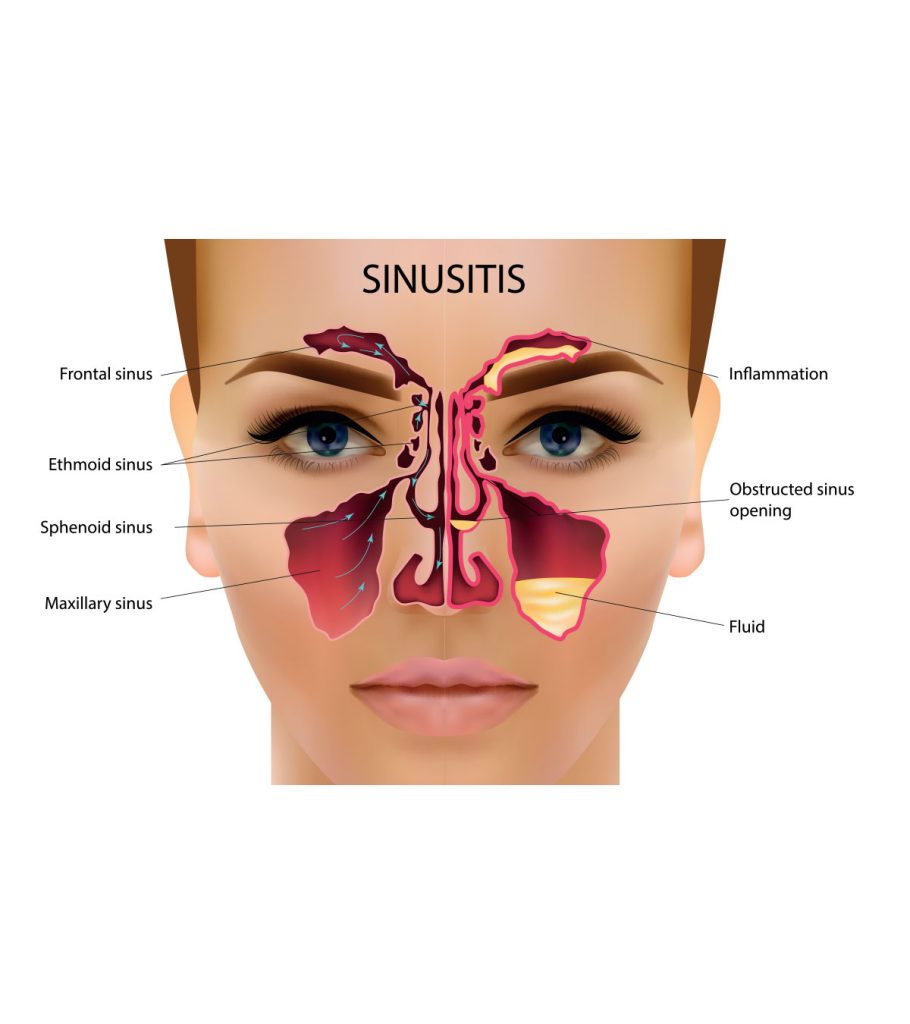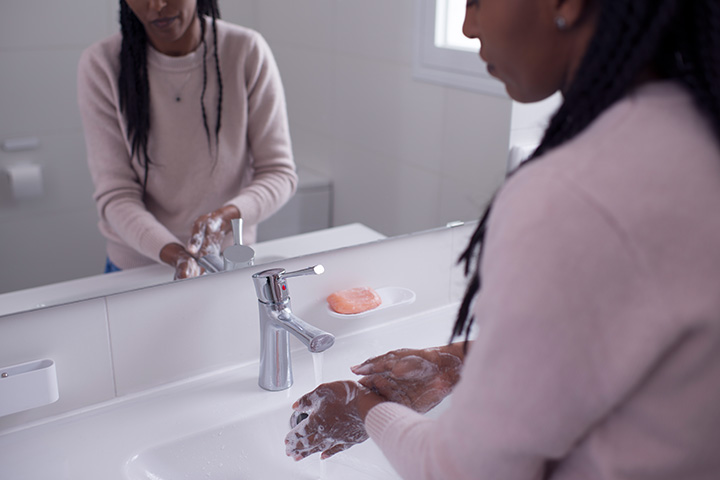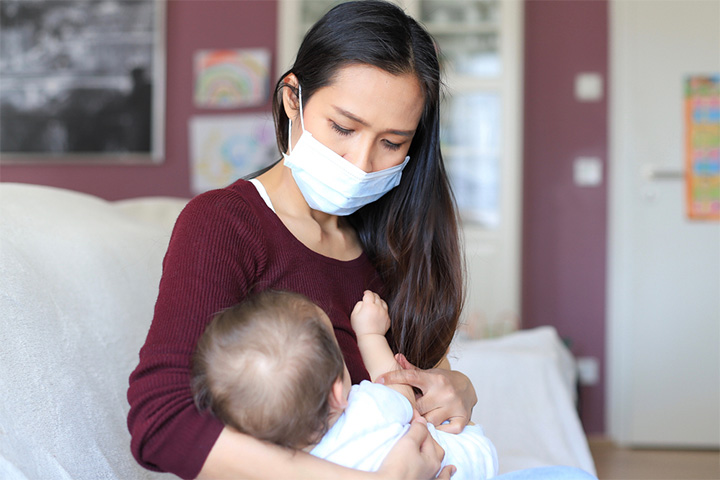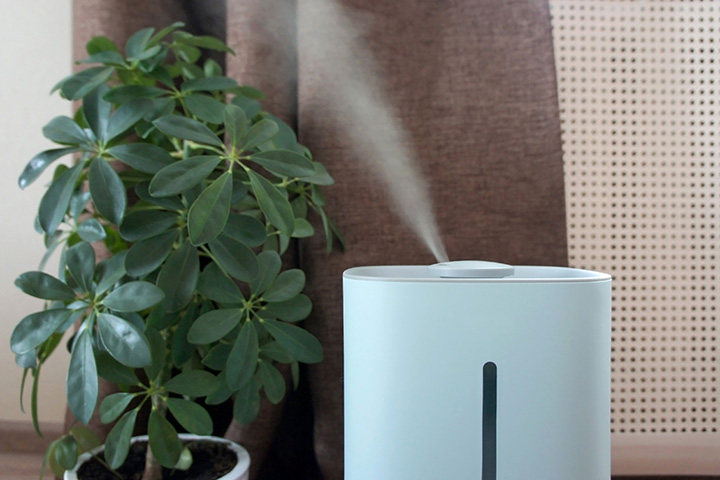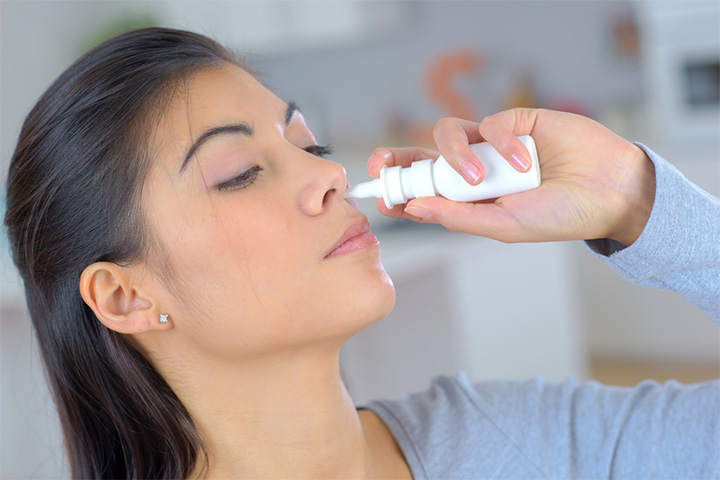Experiencing sinus infection when breastfeeding can cause discomfort to mothers, and they may worry if it can be transmitted to the baby. Also, many are unsure about the safety of medicines they take. Sinuses are air-filled spaces within the bones of the face and are most commonly located near the cheeks, around the nose, or between the eyebrows. It is a common infection that affects about 31 million people annually in the US, and a 2018 CDC National Health Interview Survey found that the prevalence of sinusitis among women in the US was around 14%. The sinuses are lined mucus membranes, and an infection may lead to sinus inflammation, thereby increasing mucus production. (1) (2). It is a common infection that affects about 31 million people in the US every year. Dr. Theodore Kremer, a board-certified pediatrician from St Louis, Missouri, says, “Bacterial sinus infections often start with plugging of one of the openings of the bones of the skull called a sinus passage. After one of these openings becomes clogged, mucus builds up in the sinuses. Bacteria can thrive and reproduce quickly when the mucus cannot drain appropriately.” Read this post to learn more about the precautions you must take while feeding if you have sinusitis, home remedies, and management of sinusitis in nursing mothers.
Can A Sinus Infection Affect Milk Supply?
Sinus infection does not directly impact the milk supply. However, certain medicines, like some decongestant sprays that are used to treat sinus infection, might reduce the quantity of milk production (3).
Danielle, a mother of four, shares, “There are times when breastfeeding gets the best of me because it feels like that’s all I do during growth spurts or days like today when my milk supply is low due to my never-ending sinus infection and little man (her son), is cluster feeding but I keep pushing through because it’s what’s best for my baby, hopefully strengthening his immune system (i).”
Could not load the poll.
Can A Mother Pass A Sinus Infection To The Baby?
The infection does not get transmitted through breast milk. It is a droplet infection which gets transmitted through coughing and sneezing. Hence, the transmission can be prevented by using a face mask and maintaining appropriate hand hygiene.
What Are Some Precautions To Take When Breastfeeding With Sinus Infection?
The following precautions might help in preventing the transmission of sinus infection from the mother to the baby.
- Wash your hands with soap and water before handling the baby and their personal items, such as toys and clothes.
- Keep tissues handy to wipe your nose.
- Use a sanitizer to clean your hands.
- If the baby touches your face with his/her fingers, then clean the baby’s hands too.
- Do not share the same utensils like the cup, glass, spoon, etc. with the baby.
- Wear a mask while breastfeeding the baby.
- Avoid kissing the baby until you are cured of the infection.
If you notice any symptoms in the baby, then see a pediatrician promptly.
What Are Some Home Remedies For Sinus Infection?
You can consider observing some simple remedies at home. The following home remedies might help significantly reduce the intensity of infection (4) (5) (6).
- Rest well and try to sleep whenever your baby sleeps.
- Keep yourself hydrated by drinking several glasses of water throughout the day.
- Use a cool-mist humidifier in your room for optimum moisture in the air.
- Boil some water and inhale the steam for relief.
- Avoid any fragrances or allergensiXA substance or protein that can cause an allergic reaction in the body that can trigger your sinus allergies.
- Put a warm compress over your head and nose to help relieve sinus pressure.
- Use a nasal saline spray.
- Inhale steam from a solution of a few drops of eucalyptus oil mixed in two cups of water.
- Consume warm soup and warm caffeine-free drinks for relief from the symptoms.
- Keep your pillow elevated so that you can breathe better.
- You might have reduced appetite, but still, eat the foods you can to have optimal breast milk production.
- Ask family or friends to help you out with the baby for a few days if your symptoms are very severe.
When To See The Doctor?
If you try the home remedies and they do not work, then you should consider visiting a doctor. A sinus infection that is diagnosed early can be treated faster. Do not wait for too long once you begin to notice symptoms of sinusitis. Use the medicines prescribed by the doctor so that you can manage the symptoms better.
Medications For Sinus infection While Breastfeeding
The doctor is likely to prescribe the following medicines for sinus infections.
- Oral decongestants like pseudoephedrine and phenylephrine are usually prescribed for sinusitis. But these medicines have exhibited a reduction in breast milk production (3). However, it is a temporary change, and the quantity becomes normal once the medicine is discontinued.
- Saline nasal sprays are safe and effective in treating sinusitis. The doctor could prescribe an over-the-counter (OTC) nasal decongestant spray to relieve the congestion and aid in sinus drainage. They are generally considered safe when used as per a doctor’s prescription (3).
- Pain medication such as acetaminophen (Tylenol) or ibuprofen (Advil) are usually considered safe for sinus pain relief in a sinus infection (7).
- Antihistamines such as cetirizine or fexofenadine are considered to be safe during breastfeeding to get relief from nasal congestion (8). Antihistamines that cause drowsiness in mothers may cause drowsiness in the babies too, and are not usually prescribed.
The doctor will suggest the timing and dosage of the medicine in a way that the concentration of the drug in breast milk is minimal. Therefore, only have the medicines as per doctor’s prescription.
What Are Some Medications To Avoid When Breastfeeding?
Generally, doctors avoid the following medicines for sinus infections when you are breastfeeding, as they could be harmful to the baby.
- Avoid OTC drugs without consulting the doctor because you should know if these medicines contain compounds that could pass into breast milk and affect the baby.
- Avoid medicines that contain naproxen (9)
- Do not consume any antibioticsiXMedicines used to treat infections caused by bacteria and other microbes for sinus infections, as most sinus infections do not need antibiotics. Viral infections do not need antibiotics. The doctor will prescribe antibiotics for severe symptoms, such as fever over 38.6°C (101.48°F), pain and tenderness in sinuses, and signs of a skin infection, such as a hot, red rash that spreads quickly (10). The commonly prescribed antibiotics are levofloxacin, moxifloxacin, and amoxicillin/clavulanate (11). If antibiotics are prescribed by the doctor, then the breastfeeding mother can safely consume it as it does not affect her breast milk.
Although some OTC medicines may not cause any potential hazard to the baby, it is suggested to use only prescription drugs.
Could not load the poll.
What To Take For A Sinus Headache While Breastfeeding?
You can take acetaminophen or ibuprofen to get relief from headaches while breastfeeding if the doctor permits (7). Avoid using any drugs without the doctor’s consent.
Since infection spreads through droplets and not via breast milk, you need not worry about your baby contracting an infection. However, the medications taken to treat a sinus infection when breastfeeding may alter the milk’s quantity. If you are experiencing sinus symptoms, maintain proper personal hygiene and rest well. Consult your doctor on the treatment plan and keep them informed of any nursing changes you notice during that period. Fortunately, this is a temporary condition, and with proper treatment and rest, you shall be healthy in a few days.
Key Pointers
- A sinus infection does not directly affect milk supply, but certain drugs used to treat it may temporarily decrease milk output.
- Sinus infection is spread through coughing and sneezing, not through breast milk.
- Precautions to take when nursing with a sinus infection include constantly cleaning hands, using tissues, wearing a mask, and avoiding kissing the infant.
- Home remedies for sinus infections include rest, fluids, steam inhalation, and warm compresses. Consult a doctor if home treatments are ineffective.
- Medications for sinus infections while nursing include saline nasal sprays, oral decongestants, pain medication, and antihistamines.
Sinusitis is a common condition that causes facial discomfort, nasal congestion, and headaches. Learn about the causes, symptoms, diagnosis, therapy, and underlying pathology of this condition.
